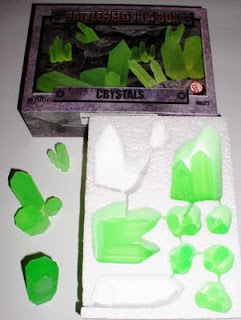Dungeonquest is a classic Games Workshop board game that has been re-released under licence by Fantasy Flight Games. The design of the game attempts to capture all of the elements of the original, plus the catacombs expansion in one novel re-interpretation.
For the main part, the re-interpretation is very true to the original in my opinion. I like the tiles and the board layout, combined with the Sun "timer" (you have until the Sun goes down to enter the dungeon, collect treasure and escape again -- the doors get locked at sundown and all players are automatically trapped / killed if they remain after that!). The Sun counter can be seen on the bottom part of the image below.

I liked many features about the game. The faithfulness to the original concept is obvious (particularly for my old-time readers) and the sturdiness of the tiles and the board is plain to see. This, combined with the quality playing pieces that Fantasy Flight Games are becoming known for makes playing the game a visual feast. The gameplay is also straight forward: each player starts in one of the corners and draws a tile every turn. If the tile is a corridor, they get to draw another one. If it is a room, they have to deal with the aspect of the room (a gaping chasm for instance, see the upper right player who has leapt over one such obstacle; a cob-web filled room can also be seen in the lower right player's pathway so far), and / or draw a card to determine the contents of the room (monsters, treasure, crypts, etc.). In the centre of the board is the dragon's lair -- this contains the more expensive treasure. But raiding the lair risks waking the dragon up and you dropping all the treasure that you've collected so far ... which is bas since the winner is determined by the player with the greatest amount of treasure (measured in gold pieces) who gets out alive.
One issue I had with the game is the large number of decks (see the upper portion of the game board). These range from not only room contents cards, but also trap cards, corpse investigation cards, treasure cards, etc. I believe that the game could be simplified by having far fewer decks: one for the room contents and one for dragon treasure. The combat system is reminiscent of the
Horus Heresy card based system. I didn't really care much for the system personally: something more approaching the Steve Jackson / Ian Livingstone "
Fighting Fantasy" system might have been superior? But that's just an opinion. The game could readily be mixed with something like "
Munchkin" for added fun I feel.
The difficulty of the game is well-known: the survival rate of the absent-minded adventurer is low. You've got to carefully plan whether you can get to the dragon's lair and out again. Some players venture only a few tiles in to the dungeon before deciding they've got enough treasure, and leap back to the exit. Often that strategy can pay off as the player survives and could win the game with only a few gold pieces of loot, whilst the other players get slowly killed off.
Overall, its a good game, but I'll be mixing in the room cards with, e.g., the corpse cards (etc.) for future plays.
 As with many other people in the hobby, I recognise the Sons of Malice as Malal's own chapter. In brief, Malal is the renegade chaos entity who opposes the other big four. Hence immediately, to build a Sons of Malal themed army, I reckon it is safe to rule out all those models who possess the mark of the big four. Explicitly: that immediately rules out plague marines, rubric marines, bezerkers, and noise marines. But what of the other entries in Codex: Chaos Space Marines?
As with many other people in the hobby, I recognise the Sons of Malice as Malal's own chapter. In brief, Malal is the renegade chaos entity who opposes the other big four. Hence immediately, to build a Sons of Malal themed army, I reckon it is safe to rule out all those models who possess the mark of the big four. Explicitly: that immediately rules out plague marines, rubric marines, bezerkers, and noise marines. But what of the other entries in Codex: Chaos Space Marines?















